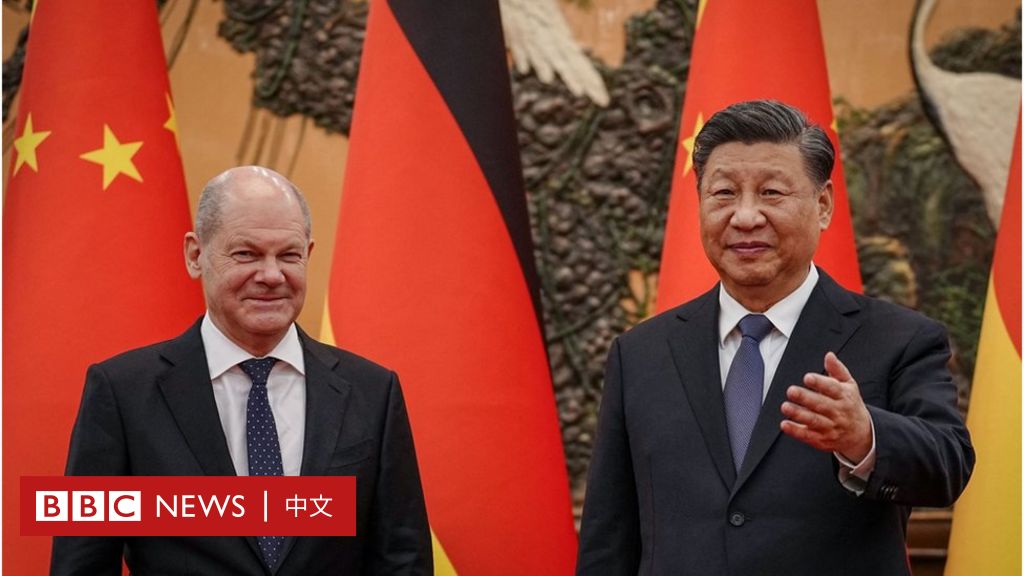image source,Getty Images
German Chancellor Scholz visited China on Friday (November 4) to meet with Chinese leader Xi Jinping.
German Chancellor Olaf Scholz arrived in China on Friday (November 4) for a one-day visit to meet Chinese leader Xi Jinping. He became the first G7 leader to visit China since the outbreak of the new corona epidemic.
Prior to this visit to China, Scholz faced criticism and concerns both at home and abroad. International relations scholars told the BBC that Germany’s economic shock forced the Scholz government to adopt a “political and economic separation” approach to China.
visit itinerary
Chinese leader Xi Jinping met with Scholz in the Great Hall of the People in Beijing on Friday morning. According to the Xinhua news agency, Xi Jinping told Scholz that this year coincides with the 50th anniversary of the establishment of diplomatic relations between China and Germany, as long as the principles of mutual respect, the search for common ground and the confidentiality of differences, exchanges and mutual learning, and win-win cooperation is maintained, the general direction of bilateral relations will not be prevented.
Xi Jinping also said that the international situation is complex and changing at the moment. As influential powers, China and Germany should work together in times of change and chaos to make greater contributions to world peace and development.
According to the Xinhua news agency, Scholz also said that China is an important economic and trading partner of Germany and Europe. Germany strongly supports trade liberalization, supports economic globalization and opposes “decoupling”. Is willing to continue to deepen economic and trade cooperation with China, and support the two countries’ enterprises, go to each other to realize investment cooperation. The German side is also willing to exchange views with the Chinese side on issues where the two sides hold inconsistent positions, strengthen mutual understanding and trust, and strive to stabilize, consolidate and develop Germany-China relations.
Reuters reported that Scholz told Xi it was good that the leaders of the two countries were meeting face to face in a tense time when the Russian invasion of Ukraine was causing problems for the global order.
Scholz also said the two sides will discuss issues such as China-EU relations, the fight against climate change and global hunger, how to develop Sino-German economic relations, and issues of differing views between the two countries.
The Reuters report also revealed that Scholz and a delegation of German business leaders were tested for the novel coronavirus after arriving in Beijing on Friday morning, with Chinese medical personnel wearing protective suits entering the plane for testing. .
After a red carpet and a welcome from the honor guard, the delegation was transferred from the airport to Diaoyutai State Guest House to await coronavirus test results. The results were negative, according to Scholz’s press team.
critical voice
Prior to the visit, Scholz faced criticism in Germany and abroad. But a German government spokesman said before Scholz’s departure that he would urge China to open up its economic markets to European companies and discuss human rights during his visit to Beijing.
An unusually heated squabble broke out recently at the highest levels of the German government when a Chinese company was preparing to buy a large stake in the Port of Hamburg.
image source,Getty Images
German Chancellor Scholz visited China on Friday (November 4).
At least six government ministers reacted violently. They believe the deal will give China significant influence over Germany’s vital infrastructure. The German security services also called for caution.
But the German chancellor seemed to be insisting that the deal go ahead. He reportedly brokered a deal, although he only gave a 24.9% stake, limiting size and influence.
Nobody knows for sure why you seem so determined. Scholz, former mayor of Hamburg, remains close to the city authorities, who see the deal as a very important investment.
But many other commentators suspect this is for additional reasons, and Scholz doesn’t want to be in Beijing without a “gift” to Xi.
In addition, 70 human rights organizations, including the World Uyghur Congress, issued an open letter asking Scholz to reconsider his trip to Beijing.
The visit comes as Xi Jinping begins his third term as general secretary of the Communist Party of China and during Xi’s first two terms, widespread and serious human rights violations in China have grown exponentially, the letter says.
“Inviting a German trade delegation to join you on your visit will be seen as Germany’s willingness to deepen trade and economic ties at the expense of human rights and international law,” the letter states.
The letter also said that Scholz’s visit at this time would send a worrying signal that democracies are not united in the face of China’s growing authoritarian behavior around the world.
image source,AFP
More than 100 Chinese activists overseas have published an open letter listing five reasons why Scholz shouldn’t visit China.
More than 100 Chinese activists overseas have also published an open letter listing five reasons why Scholz shouldn’t visit China. Signatories to the open letter include leaders of the June 4 student movement Wang Dan and Wuer Kaixi.
Among the reasons listed in the open letter is the search for the origin of the new corona epidemic, the third rule of Xi Jinping after the 20th National Congress of the Chinese Communist Party, the Xinjiang Uyghur question, the Hong Kong question and the Taiwan issue.
“As a politician, have you considered and measured that today’s China is not just a totalitarian state, but is gradually becoming a new Nazi-style dictatorship? Will your trip to China involve economic and political risks?” The open letter reads: “Xi Jinping’s current regime is troubled both internally and externally, with infighting and public grievances emerging one after another. As the first leader of the free world to visit China between the liberal democracies of the world, what opinions do you intend to express in China? “
Back to the big Chinese market
Zhang Mengren, associate professor in the Italian Department of the Fu Jen Catholic University in Taiwan, told BBC Chinese that the new corona epidemic, the Russo-Ukrainian war and the ensuing inflation and energy crisis have hit Germany, a major exporter. and a rare economic downturn. The economic shock caused by the energy crisis forced Prime Minister Scholz to return to the large Chinese market to look for gold owners.
Zhang Mengren stressed that Scholz’s visit to China has three meanings: “First, he went to China after the 20th National Congress with the mentality of dialogue with China, trying to bridge the gap between the G7 and the China; second, in the aforementioned bridge In exchange for orders from China; third, as the first Western power to go to Beijing after the 20th National Congress of the Chinese Communist Party, can conduct a thorough investigation and benefit from the goodwill of Xi Jinping against Germany “.
Zhang Mengren believes that, after an overall assessment, Germany found that it is difficult to leave the Chinese market and it is foreseeable that Germany will not abandon the Chinese market, but will not give up its participation in the deployment of security in the Indo-Pacific region, and also do more normal deployments, and will be vigilant internally. Foreign investments in key structures and external decentralization.
image source,Getty Images
Zhang Mengren believes that the economic shock caused by energy forced Prime Minister Scholz to return to the large Chinese market to look for gold owners.
“The separation of politics and economics from China will be the means of the Scholz government,” said Zhang Mengren.
Zsuzsa Anna Ferenczy, assistant professor at Donghua University in Taiwan, believes that at this time Germany has sent such a high-profile business delegation for its own interests to damage Germany’s credibility and the EU’s steadfastness and unity. facing the Chinese question.
“This visit will damage Europe’s emerging but fragile consensus on China, which is only in Beijing’s interest,” said Feng Rusha.


